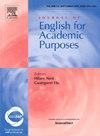论文写作中的生成人工智能:L2博士生的自我报告使用、人工智能主义和感知的培训需求
IF 3.4
1区 文学
Q1 EDUCATION & EDUCATIONAL RESEARCH
引用次数: 0
摘要
生成人工智能(GenAI)已经被L2博士生广泛使用,以协助他们的论文写作。然而,对于这些学生如何使用GenAI工具来完成高等教育中重要的写作任务,我们知之甚少。为了解决这一差距,我们进行了一项定性研究,探讨了二级博士生在论文写作中自我报告使用GenAI工具的情况,对人工智能诱导的剽窃(AI-giarism)的担忧,以及感知到的培训需求。我们采访了来自美国中南部一所公立大学不同院系的54名博士生,并运用主题分析来探讨学生的观点。研究结果表明,L2博士生使用GenAI工具有18个不同的目的,可分为探索、确认和执行。关于人工智能剽窃,出现了两个主要主题:(1)学生对合法使用GenAI和剽窃之间界限的不确定性;(2)他们在是否承认在论文中使用GenAI的困境。关于感知到的培训需求,学生们表达了学习各种适合特定任务的GenAI工具的愿望,有效的提示,解决抄袭问题,以及管理数据隐私问题。本文章由计算机程序翻译,如有差异,请以英文原文为准。
Generative AI in dissertation writing: L2 doctoral students’ self-reported use, AI-giarism, and perceived training needs
Generative Artificial Intelligence (GenAI) has been extensively employed by L2 doctoral students to assist with their dissertation writing. However, little is known about how these students engage with GenAI tools to complete their significant writing tasks in higher education. To address this gap, we conducted a qualitative study exploring L2 doctoral students' self-reported use of GenAI tools for dissertation writing purposes, concerns about AI-induced plagiarism (AI-giarism), and perceived training needs. We interviewed 54 doctoral students from different departments at a public university in the American Central South and applied thematic analysis to explore students’ perspectives. The findings showed that L2 doctoral students use GenAI tools for 18 distinct purposes, which can be categorized into exploration, confirmation, and execution. Two major themes emerged regarding AI-giarism: (1) students' uncertainty about the boundary between legitimate GenAI use and plagiarism, and (2) their dilemma over whether to acknowledge using GenAI in their dissertations. Regarding perceived training needs, students expressed a desire to learn about various GenAI tools suited for specific tasks, effective prompting, addressing plagiarism concerns, and managing data privacy issues.
求助全文
通过发布文献求助,成功后即可免费获取论文全文。
去求助
来源期刊

Journal of English for Academic Purposes
Multiple-
CiteScore
6.60
自引率
13.30%
发文量
81
审稿时长
57 days
期刊介绍:
The Journal of English for Academic Purposes provides a forum for the dissemination of information and views which enables practitioners of and researchers in EAP to keep current with developments in their field and to contribute to its continued updating. JEAP publishes articles, book reviews, conference reports, and academic exchanges in the linguistic, sociolinguistic and psycholinguistic description of English as it occurs in the contexts of academic study and scholarly exchange itself.
 求助内容:
求助内容: 应助结果提醒方式:
应助结果提醒方式:


